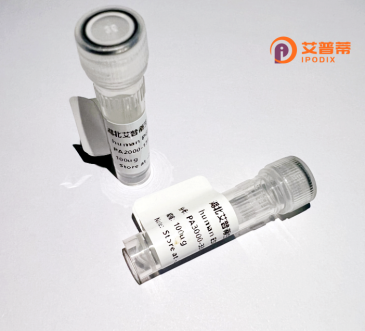
| 纯度 | >90%SDS-PAGE. |
| 种属 | Human |
| 靶点 | ST6GALNAC4 |
| Uniprot No | Q9H4F1 |
| 内毒素 | < 0.01EU/μg |
| 表达宿主 | E.coli |
| 表达区间 | 1-302 aa |
| 活性数据 | MKAPGRLVLIILCSVVFSAVYILLCCWAGLPLCLATCLDHHFPTGSRPTVPGPLHFSGYSSVPDGKPLVREPCRSCAVVSSSGQMLGSGLGAEIDSAECVFRMNQAPTVGFEADVGQRSTLRVVSHTSVPLLLRNYSHYFQKARDTLYMVWGQGRHMDRVLGGRTYRTLLQLTRMYPGLQVYTFTERMMAYCDQIFQDETGKNRRQSGSFLSTGWFTMILALELCEEIVVYGMVSDSYCREKSHPSVPYHYFEKGRLDECQMYLAHEQAPRSAHRFITEKAVFSRWAKKRPIVFAHPSWRTE |
| 分子量 | 60.6 kDa |
| 蛋白标签 | GST-tag at N-terminal |
| 缓冲液 | PBS, pH7.4, containing 0.01% SKL, 1mM DTT, 5% Trehalose and Proclin300. |
| 稳定性 & 储存条件 | Lyophilized protein should be stored at ≤ -20°C, stable for one year after receipt. Reconstituted protein solution can be stored at 2-8°C for 2-7 days. Aliquots of reconstituted samples are stable at ≤ -20°C for 3 months. |
| 复溶 | Always centrifuge tubes before opening.Do not mix by vortex or pipetting. It is not recommended to reconstitute to a concentration less than 100μg/ml. Dissolve the lyophilized protein in distilled water. Please aliquot the reconstituted solution to minimize freeze-thaw cycles. |
以下是关于ST6GALNAC4蛋白的3篇代表性文献摘要信息:
1. **文献名称**: "ST6GALNAC4 promotes tumor invasion by enhancing sialylation of integrin β1 in human cancer cells"
**作者**: Miyazaki K, et al.
**摘要**: 研究揭示了ST6GALNAC4通过介导整合素β1的唾液酸化修饰,增强癌细胞黏附与迁移能力,促进肿瘤侵袭转移的分子机制。
2. **文献名称**: "ST6GALNAC4 expression is associated with poor prognosis and promotes glioblastoma cell migration"
**作者**: Vasquez EG, et al.
**摘要**: 分析表明,ST6GALNAC4在多形性胶质母细胞瘤中高表达,与患者预后不良相关,其通过调控细胞表面糖基化修饰促进肿瘤细胞迁移能力。
3. **文献名称**: "Epigenetic regulation of ST6GALNAC4 alters sialyl-Tn antigen expression in colorectal cancer"
**作者**: Park DD, et al.
**摘要**: 该研究证实,DNA甲基化异常导致ST6GALNAC4在结直肠癌中低表达,进而影响sialyl-Tn肿瘤相关糖抗原的产生,参与肿瘤免疫逃逸过程。
---
提示:如需更详细文献信息(期刊/年份),可补充说明研究方向(如糖基化机制、特定癌症类型)。
ST6GALNAC4. a member of the ST6 N-acetylgalactosaminide alpha-2.6-sialyltransferase family, is an enzyme involved in protein glycosylation—a critical post-translational modification process. This protein catalyzes the transfer of sialic acid (Neu5Ac) to terminal N-acetylgalactosamine (GalNAc) residues on glycoproteins and glycolipids, forming α2.6-linkages. Such modifications are essential for mediating cell-cell interactions, immune responses, and cellular signaling. The ST6GALNAC4 gene is located on human chromosome 9q34.2 and is expressed in various tissues, with higher levels observed in the brain, placenta, and certain cancers.
Recombinant ST6GALNAC4 protein is produced using engineered expression systems (e.g., mammalian cells or bacteria) to enable precise study of its enzymatic activity and structure-function relationships. Dysregulation of ST6GALNAC4 has been linked to tumor progression, metastasis, and immune evasion due to altered cell surface sialylation patterns, which influence receptor binding and cell adhesion. In neuroscience, it may regulate synaptic plasticity through glycosylation of neural cell adhesion molecules. Its recombinant form is vital for developing diagnostic tools, exploring cancer biomarkers, and designing glycoengineering therapies. Research also explores its role in pathogen-host interactions, as viral or bacterial pathogens often exploit host sialylated structures for infection.
×